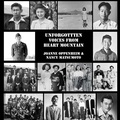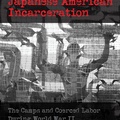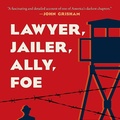Read Part 3 >>
During the last half of 1947, Omura did take another stab at editing the Rocky Shimpo. But his postwar editorial mission to expose and stop the JACL occurred when their leadership controlled the community, enjoyed the full support of the U.S. government, and was promoting measures resonate within their community and mainstream America. This story deserves extended treatment,1 but only one sidebar, Omura’s clash of words and worldviews with Minoru Yasui will be broached here.
It is ironic that Yasui and Omura, Pacific Northwest Nisei dissidents who alike championed constitutional and human rights, should have become mortal enemies within wartime and postwar Denver. Their interaction commenced while attorney Yasui was serving a jail sentence in Portland, Oregon, during 1942-1943 for violating the Army’s curfew order so as to provoke a constitutional test case. Although Yasui was a member of JACL, its leadership opposed test cases by, to quote Mike Masaoka, “self-styled martyrs.”2 While in solitary confinement, Yasui took exception, by post, to Omura’s published boast that his placement bureau “represent[s] the ONLY people of Japanese ancestry to demand equal consideration and treatment as citizens of the United States and to fight for these rights.”
Their next confrontation was in Denver on April 19, 1944, just before Omura’s resignation as editor. While detained at the Minidoka camp Yasui had altered his attitude toward Nikkei who chose the path of most resistance during wartime. Along with two local JACL leaders, Yasui came to the Rocky Shimpo office to confer with Omura about his Nisei draft position, but left by snarling at him, “I’m going to see you go to prison one way or another.”3
Yasui became a Denver resident in fall 1944 and began his law practice two years later. Additionally, he promoted JACL fortunes as the local chapter’s vice-president and the national organization’s regional representative. In fall 1947, he became a Colorado Times columnist, and through his “Denver Nisei-Grams” column Yasui next locked horns with Omura.
On May 16, 1947, Omura promised Rocky Shimpo readers in his resuscitated “Nisei America: Know the Facts” column to expect a “progressive type of journalism” that will “freely criticize wherever occasions demand.” He further sounded a warning to the JACL leadership: “Those who have disagreed with us in the past and have been unpardonably guilty of working nefariously in the shadows may evince certain misgivings with our return to the Nisei journalistic wars. They have cause to feel uneasy.”
Omura’s special brand of “liberalism” pervaded his 1947 columns,4 roughly one-fifth of which criticized JACL leadership and policies. On August 2, for example, Omura blasted the “selfish and arrogant” JACL leadership for denying “the right of any Nisei to hold views contrary to its own.”
Min Yasui’s initial Colorado Times column of September 23, 1947, boosted Denver: a liberal, progressive city that was “fair-minded toward minority groups.” Thereafter, Yasui’s columns were free of boosterism,5 except when spotlighting the JACL leadership. “Despite acrimonious criticism to the contrary,” declared Yasui on September 30, “[Mike]Masaoka has done an outstanding job in Washington D.C. He has been able to shove through a complete legislative program [naturalization rights for Issei; evacuations claims indemnification; and equality in deportation laws] halfway thru Congress in a single session.”
A face-off between Omura and Yasui was catalyzed by Omura’s strenuous objection to Times editor Fred Kaihara’s statement that no discrimination of significance toward Nikkei existed in either wartime or present-day Denver. Wartime discrimination against Japanese Americans, fumed Omura, had been both “widespread” and “bitter,” especially in employment, while postwar prejudice extended to public accommodations, education, and housing.
When Yasui charged that Omura’s ravings about discrimination were “not borne out by facts,” Omura denigrated Yasui as a “whipping boy” for Kaihara who was “not conscientious of the truth.” Whereas the Rocky Shimpo’s policy “pointed up” instances of discrimination, observed Omura, the policy of the Colorado Times “pointed down” such behavior.
What differentiated his outlook from Omura’s, bristled Yasui, was that “we have tried to DO something actual about discriminatory situations,” while he has been negatively fixated on the fact of discrimination. There was probably a basis for a debate between them, Yasui pondered, “but we refuse to fight the wind, even as we found that butting our head against a stone wall during evacuation was fruitless.”
Omura’s November 24 issue featured a city-commissioned report’s finding that “racial prejudice in Denver was on the rise and had seeped into virtually every phase of community life.” In this same edition, Omura took Yasui to task for calling him a do-nothing Cassandra while posturing as a constructive doer in the fight against discrimination.
On December 4, a small Rocky Shimpo item announced James Omura’s resignation as editor, effective December 15. Personal finances figured heavily in Omura’s decision. So also did fatigue. Throughout much of his editorship, Omura had operated the Omura Landscape Service,6 and this double duty exacted its price.7
Omura fired parting shots at the JACL, the Colorado Times, and Min Yasui. On December 3 he declared the JACL’s liberal element its best reform hope. But it would have to occur, he wrote on December 9, before the JACL’s fanatics destroyed the organization. Unfortunately, he remarked, these fanatics pervaded the top leadership, demanded other Nisei’s unqualified allegiance, and were virtually immune to constructive criticism.
Omura’s December 12 editorial compared his newspaper’s approach with that of the Times. Whereas the Rocky Shimpo was forthright about the inadequacy of the JACL leadership, the Times both defended that leadership and shielded it from criticism. A “vicious example” was Yasui attributing to Omura the “patently false and absolutely untrue” allusion that none of Denver’s leaders were any good at all. “We have labeled this statement,” explained Omura, “a lie. Mr. Yasui has threatened to sue us unless we retract. We have refused to retract. The next move is Mr. Yasui’s.”
In the December 18 Times, Yasui responded to Omura’s indictment of the Rocky Shimpo: The Times believed in objective reporting of the news and covering topics of interest to local Nisei residents, including discrimination, but also strove to encourage Nisei and place Nisei activities in “the best possible light.” He admitted his having considered suing Omura, but now felt this action pointless. It was quite enough for him that “a disturbing factor in Denver journalism is now gone.”
Still, on December 29 Yasui revisited the issue most responsible for the bad blood with Omura—wartime Nisei draft resistance. What provoked Yasui’s editorial was President Harry Truman granting amnesty to the 315 convicted Japanese American draft violators. Although charitable toward those resisting “to register a legal protest against evacuation,” especially under the extenuating circumstances, Yasui’s commentary represented a stinging critique of the Fair Play Committee, Omura, and Nisei draft “evaders.”
When other Nisei boys were slugging against the enemy, reports of draft violation hit the morale of our Nisei GI’s. On the home front, refusal to serve was construed by the public as out-right disloyalty. But now…we believe that this is the end of that sad and shameful story.
A moral that we can safely draw…is that as citizens and as human beings, we must first fulfill our obligations to the nation and society before we can legally or socially expect that our complete rights will be granted to us.”
Thus, by the closing of 1947, a perceptive observer could conceivably have grasped the current power arrangements in Japanese Denver, glimpsed the contours of the emerging collective memory as to the Japanese American wartime experience (within both the Nikkei and mainstream American communities), and fathomed the likely trajectory of postwar Japanese American society and history.
To be continued...
Notes:
1. See Arthur A. Hansen, “Return to the Wars: Jimmie Omura’s 1947 Crusade Against the Japanese American Citizens League,” Chp. 7 in Sucheng Chan, ed., Remapping Asian American History (Walnut Creek, CA: AltaMira Press, 2003).
2. See Minoru Yasui’s interview in John Tateishi, And Justice for All: An Oral History of the Japanese American Detention Camps (New York: Random House, 1984), 80-82.
3. Omura to Hansen, 301.
4. Omura praised the Committee for Industrial Organizations (CIO), urged Nisei to join unions, and called for the abolition of race, sex, and creed-based restrictions in union constitutions.
5. Commonly, Yasui promoted civic-minded, liberal organizations and individuals, and minority rights.
6. See “Shimpo Editor to Assume Full Time Duty With Paper,” Rocky Shimpo, 30 October 1947.
7. See “The Facts and Mr. Tanaka,” Rocky Shimpo, 12 August 1947.
* Arthur A. Hansen, “Peculiar Odyssey: Newsman Jimmie Omura’s Removal from and Regeneration within Nikkei Society, History, and Memory” in Louis Fiset and Gail Nomura, eds. Nikkei in the Pacific Northwest: Japanese Americans and Japanese Canadians in the Twentieth Century. Seattle: University of Washington Press, 2005, pp. 278-307.
© 2005 by the University of Washington Press





